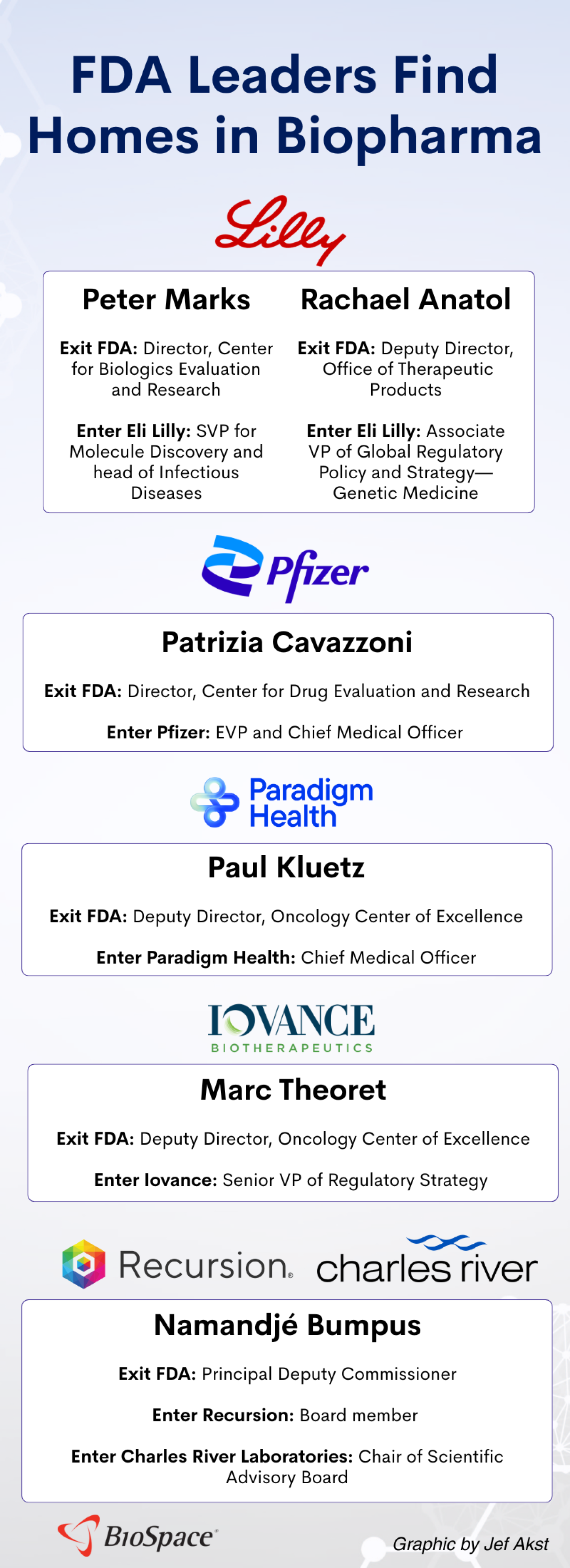After a chaotic year that has seen the attrition of over half the FDA’s senior leadership, many of these individuals have landed new roles—at Eli Lilly, Pfizer, Iovance and more. The FDA’s loss, it seems, is largely the pharmaceutical industry’s gain.
The Trump administration came into power with a mission to turn the current establishment upside down. At the FDA, this has led to the exodus of more than half the agency’s top ranks in the past year, with some, like Center for Drug Evaluation and Research head Patrizia Cavazzoni, leaving before Jan. 20, and others, including Center for Biologics Evaluation and Research Director Peter Marks, eventually being forced out.
Now, nine months into President Donald Trump’s second term—and eight months into Robert F. Kennedy Jr.’s tenure as Health Secretary—many of these former FDA leaders have moved on to their next endeavors. Unsurprisingly, many have made the jump to the pharmaceutical industry.
While some have questioned the ethics of this so-called “revolving door,” others have pointed out its inevitability. When news of Marks’ new employment at Eli Lilly broke last week, policy and regulatory consultant Steven Grossman spoke out to naysayers. “Where is Dr. Marks supposed to take his education and experience other than a place where he can continue to advance medical science and patient care?” Grossman wrote in an email shared with the media on Oct. 8. “Should he become a used car salesman to satisfy some people’s fevered imagination that something wrong has occurred?”
Here, BioSpace takes a look at how some key figures left the FDA and where they’ve landed.
Peter Marks
Past: FDA Center for Biologics Evaluation and Research, Director
Current: Eli Lilly, SVP for Molecule Discovery and head of Infectious Diseases
At the end of March, the forced resignation of former CBER Director Peter Marks sent biotech shares tumbling, as “arguably biotech investors’ greatest fear” was realized, according to a Stifel note at the time.
Marks, a long-time champion of cell and gene therapy who was widely seen as a bastion of stability within the FDA, had hoped to work to address Kennedy’s concerns regarding vaccine safety and transparency, he wrote in his resignation letter. However, he concluded, “It has become clear that truth and transparency are not desired by the secretary, but rather he wishes subservient confirmation of his misinformation and lies.”
Marks has stayed largely out of the spotlight since then, save for speaking out against the FDA’s new risk-based COVID-19 vaccine framework in a New England Journal of Medicine editorial in June. But on Oct. 7, news broke that Marks had joined GLP-1 juggernaut Eli Lilly as senior vice president for Molecule Discovery and head of Infectious Diseases.
“Lilly continually evaluates breakthrough science which could benefit patients,” Stefanie Prodouz, a company spokesperson, told STAT News. “Peter’s expertise strengthens our abilities across multiple areas, both in our existing portfolio and in our work in emerging areas.” Notably, infectious disease is not currently listed as one of Lilly’s core therapeutic areas, but molecule discovery could encompass a wide range of R&D.
In making the move to Lilly, Marks joins his former FDA colleague Rachael Anatol, whom the pharma snagged last month after her abrupt departure from the agency.
Rachael Anatol
Past: FDA Office of Therapeutic Products, Deputy Director
Current: Eli Lilly, Associate VP of Global Regulatory Policy and Strategy—Genetic Medicine
Prior to June, Anatol was deputy director of the FDA’s Office of Therapeutic Products (OTP). That was before she and her boss, Nicole Verdun, were placed on administrative leave.
After this news broke, the Alliance for Regenerative Medicine said in a statement that Verdun and Anatol had “modernized the FDA’s regulatory approach to cell and gene therapy (CGT), earning the trust and respect of the CGT community and helping to ensure that the FDA was the global leader in this evolving field.”
While the reasons behind the move were not made clear, rumors spread that Verdun and Anatol’s ouster may have had something to do with deramiocel, a cell therapy being developed by Capricor Therapeutics. The two leaders were allegedly “put on administrative leave because of an argument about our file, and that Prasad wanted to CRL us and Nicole was fighting it,” Capricor CEO Linda Marbán told BioSpace in August, recounting what she had heard from a STAT reporter who contacted her after receiving a tip from an agency insider.
In September, Lilly announced that Anatol would now serve as its associate vice president of Global Regulatory Policy and Strategy for Genetic Medicine. On the sidelines of the BIO2025 conference in June, Julie Gilmore, vice president and global head of Lilly Gateway Labs and Catalyze360 Portfolio Management, told BioSpace that genetic medicine, along with platforms, is an unofficial fifth focus for the company, which can span its four core key focus areas of obesity, type 2 diabetes, oncology and immunology.
Paul Kluetz
Past: FDA Oncology Center of Excellence, Deputy Director
Current: Paradigm Health, Chief Medical Officer
In March, top cancer regulators Paul Kluetz and Marc Theoret signaled their intention to depart the FDA. Kluetz, who joined the agency as a medical reviewer in 2016, rose to the level of deputy director of the Oncology Center of Excellence, where he assisted in the strategic and operational oversight of the division. He also held an acting role overseeing the solid tumor and toxicology divisions within the Office of Oncologic Diseases, according to an FDA biography from June 2023.
But in late March, Kluetz, along with Theoret, told colleagues of plans to leave the FDA, STAT News reported, citing multiple sources familiar with the issue.
Kluetz resurfaced almost immediately, according to his LinkedIn profile, as the chief medical officer of Paradigm Health, a Columbus, Ohio–based clinical research platform incubated by ARCH Venture Partners. Paradigm aims to “break down barriers across the trial ecosystem through one seamless infrastructure implemented at healthcare provider organizations, bringing potentially life-saving therapies to patients faster,” according to its website.
Along with his duties at Paradigm, LinkedIn reports that Kluetz is also an attending physician at Georgetown University Hospital in Washington, DC.
Marc Theoret
Past: Oncology Center of Excellence, Deputy Director
Current: Iovance Biotherapeutics, Senior VP of Regulatory Strategy
Theoret had been with the FDA for more than 15 years when he departed in March, having joined as a medical reviewer in 2009, according to STAT. Like with Kluetz, it didn’t take long for Theoret to find a new gig, with cancer biotech Iovance Biotherapeutics announcing in July that he would take the newly created position of senior vice president of regulatory strategy.
“Dr. Theoret brings over 15 years of FDA experience, including five years as Deputy Center Director of the Oncology Center of Excellence and leadership in regulatory reviews for hematological malignancies and solid tumors,” the company said in its announcement, adding that Theoret’s hiring “strengthens Iovance’s regulatory capabilities,” particularly as it advances its tumor infiltrating lymphocyte (TIL) therapy pipeline.
Theoret also previously conducted adoptive cellular therapy trials for patients with melanoma and other solid tumors at the National Cancer Institute as a clinical fellow.
Patrizia Cavazzoni
Past: FDA Center for Drug Evaluation and Research, Director
Current: Pfizer, EVP and Chief Medical Officer
Patrizia Cavazzoni stepped down from her role as CDER director on Jan. 18, two days before Trump took office. Cavazzoni had led FDA’s most influential division since 2021, when Janet Woodcock became interim FDA commissioner.
Just over a month later, Cavazzoni returned to familiar ground, taking over as chief medical officer at Pfizer. The physician regulator had previously spent nearly eight years at the New York–based company, serving as head of clinical science and operations, head of development operations and head of established worldwide safety and established products regulatory, among other roles, according to her LinkedIn profile. Cavazzoni left Pfizer in 2018 to take up the role of deputy director of operations at CDER.
“Under Dr. Cavazzoni’s leadership at CDER, there was significant innovation in drug evaluation and research, with a focus on advancing public health initiatives,” according to Pfizer’s announcement at the time of her rehiring.
Cavazzoni’s move attracted criticism on ethical grounds. Vinay Prasad—now CBER director—said in a blog post that Cavazzoni’s move “is the core rot in American regulation,” and is behavior that is “abhorrent, and […] should be criminal,” Pharmaphorum reported on Feb. 25. Robert Steinbrook, director of the consumer advocacy group Public Citizen’s health research group, said the appointment “demonstrates that the revolving door between the FDA and the industries it regulates is alive and well and continues to undermine the FDA’s credibility as a public health agency.”
Namandjé Bumpus
Past: FDA, Principal Deputy Commissioner
Current: Recursion, Board member
Charles River Laboratories, Chair of Scientific Advisory Board
Namandjé Bumpus joined the FDA in 2022 as chief scientist, then replaced Janet Woodcock as principal deputy commissioner when she retired at the end of 2023. But less than a year later, former FDA Commissioner Robert Califf broke the news of Bumpus’ resignation to staffers the week before Christmas, STAT reported. Since then, the former regulator has picked up two board seats and founded a consulting firm.
Bumpus launched Bumpus Advising in February, according to her LinkedIn profile, which advises academic institutions and companies on “preclinical and clinical regulatory science strategy and policy.” The following month, Bumpus took a seat on the board of AI biotech Recursion. “I’m excited to help guide Recursion’s scientific approach, advance their innovative pipeline, and accelerate the integration of technology in drug discovery,” she wrote on LinkedIn at the time.
And just last week, Charles River Laboratories announced that Bumpus would lead its newly created global, cross-functional Scientific Advisory Board, intended to “guide the company’s strategic focus on New Approach Methodologies.”







